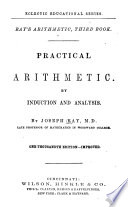 | Benjamin Greenleaf - 1854 - 342 pages
...for the payment of the whole. Hence the following RULE. — Multiply each payment by the time before it is due, then divide the sum of the products by the sum of the payments, and the quolient will be the true time required. NOTE 1. — This is the rule usually adopted by merchants,... | |
 | J. R. Young - 1854 - 228 pages
...each sum by the number of months, or weeks, &o., which are to elapse before payment is to be made, and then divide the sum of the products by the sum of the bills, the quotient will be what is called the equated time in which all should be paid if they are... | |
 | James Gray - Arithmetic - 1854 - 120 pages
...which a debt due at dif. ferent times may be discharged at once, without disadvantage to either party. RULE. Multiply each payment by the time at which it is due ; divide the вит of the products by the amount of tho debt : the quotient is the time required.... | |
 | Barnard Smith - Arithmetic - 1854 - 368 pages
...equated time. RULE. " Multiply each debt into the time which will elapse before it becomes due, and then divide the sum of the products by the sum of the debts ; the quotient will be the equated time required." Ex. 1. A owes В £100, whereof £40 is to... | |
 | Charles Guilford Burnham - 1857 - 342 pages
...= 5 months, the answer. Hence the RULE. Multiply each payment by the time when it becomes due, and divide the sum of the products by the sum of the payments, and the quotient will be the time required. 2. A merchant has owing him $420, to be paid as follows : $100... | |
 | Charles Guilford Burnham - Arithmetic - 1857 - 328 pages
...5 months, the answer. Hence the ' RULE. Multiply each payment by the time when it becomes due, and divide the sum of the products by the sum of the payments, and the quotient will be the time required. 2. A merchant has owing him $420, to be paid as follows : $100... | |
 | James Stewart Eaton - Arithmetic - 1857 - 376 pages
...RULE. — Multiply each debt by the number expressing the time to elapse before it becomes due, and then divide the sum of the products by the sum of the debts. Ex. 2. What is the equated time for paying the following debts, viz. $400, due in 6m. ; $500,... | |
 | Barnard Smith - 1857 - 740 pages
...equated time. RULE. " Multiply each debt into the time which will elapse before it becomes due, and then divide the sum of the products by the sum of the debts ; the quotient will be the equated time required." Ex. 1. A owes B £100, whereof £40 is to... | |
 | Benjamin Greenleaf - Arithmetic - 1857 - 336 pages
...payment of the whole. Hence the following RULE. — Multiply each payment by its own time of credit, and divide the sum of the products by the sum of the payments. NOTE 1. — This is the rule usually adopted by merchants, hut it is not perfectly correct ; for if... | |
 | Joseph Ray - Arithmetic - 1857 - 348 pages
...COMMON RULE FOR EQUATION OP PAYMENTS. Multiply each payment by the time to elapse till it becomes due; divide the sum of the products by the sum of the payments ; the quotient will be the equated time. When one of the payments is due on the day from which the... | |
| |